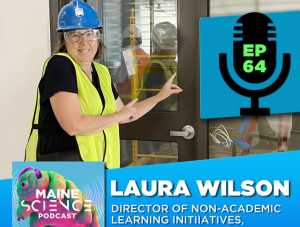
Kate Dickerson is the Executive Director of the Maine Discovery Museum and Founder of the Maine Science Festival. As host of the Maine Science Podcast (External Site), she recently sat down for a conversation with Laura Wilson, Director of Non-Academic Learning Initiatives at the University of Maine Cooperative Extension (UMaine Extension). Wilson also serves on the University of Maine System (UMS) Micro-Credential Initiative Steering Committee. After discussing Wilson’s academic and professional path to her current role, the conversation turns to micro-credentials approximately 22 minutes into the episode (External Site).
Wilson shares that the genesis of micro-credentials within UMaine Extension was sparked by the desire to recognize the skills of college students that weren’t reflected on a transcript. These students, who are trained in positive youth development, experiential learning, leadership, and collaboration, can now earn a 4-H STEM Ambassador Micro-Credential (External Site).
The discussion then turns to micro-credentials’ role in workforce development. Wilson gives examples of two micro-credentials, Maine Horticulture Apprenticeship (External Site) and Recirculating Aquaculture Systems (External Site), which were developed by UMaine Extension in coordination with industry partners and aligned with industry-specific competency standards. “When we’re developing credentials, we do need to think about who is going to want to see those and who the employer is,” she states. She describes the quality assurance built into the UMS Micro-Credential Framework to ensure a workforce need and that credentials are rigorous and evidence-based.
And, says Wilson, “by providing the learners with this documentation . . . it allows them to articulate those skills they learned during the program” and to describe them in a job interview. Learners can communicate how their knowledge and skills were assessed and by whom, and can easily access and share badges they have earned.
“It’s a win-win,” chimes in Dickerson.
Over the past five years, UMaine Extension has developed fourteen micro-credential pathways and ten stand-alone micro-badges for youth, college students, and adult learners and has issued over 875 badges.
The University of Maine System’s (UMS) Micro-Credential Initiative supports the development and implementation of micro-credentials across the system’s seven universities, law school, and Cooperative Extension. UMS micro-credentials are made up of digital badges that highlight the earner’s competencies in skills needed for today’s workforce. They are offered to UMS students, youth, and as professional development opportunities for individuals in the workforce to advance or increase their employability. Micro-credentials earned through the University of Maine System are verified, stackable, evidence-based, and shareable. For further information about the UMS Micro-Credential Initiative, visit the website or email ums.mc@maine.edu. A full catalog of all UMS Micro-Credentials (External Site) is found on the badging platform.
